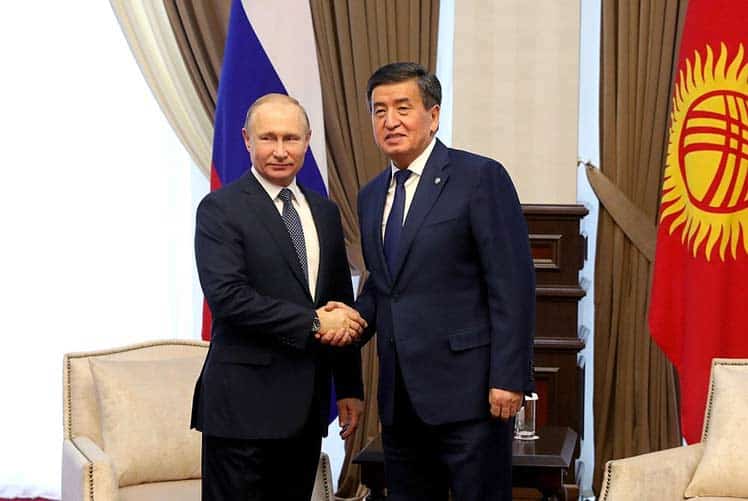Putin’s Visit to Kyrgyzstan Bolsters Integration in Eurasia

Russian-Kyrgyz relations have been making steady progress in general. However, over the past several years, bilateral cooperation has been marred by a number of negative trends.
First, the initial benefits Kyrgyzstan derived from joining the EAEU have already had their effect. These included resolving the bulk of issues with migrant workers; redistributing revenue from customs duties in the Union, which replenished the Kyrgyz budget; expanding trade with Russia and Kazakhstan; and receiving a number of financial subsidies for building the customs, sanitary and economic infrastructure. However, without further expanding production or fully implementing the mutually agreed terms and conditions for joining the EAEU, the national economy and integration processes in general will tend to stagnate.
Second, the accession of Kyrgyzstan to the EAEU has led to an increase in the flow of China-made goods across the antiquated Kyrgyz customs border. The goods were largely free of customs duties. This seriously affected its trade and economic relations with Kazakhstan and Russia and led to the permanent closure of the Kazakh-Kyrgyz border. The low quality and general inadequacy of the customs and sanitary infrastructure in the country has emerged as a major issue.
Third, the situation in neighboring Afghanistan has changed after some of the militants from Syria and Iraq relocated there. This increases instability along the borders of the EAEU states.
Fourth, the redistribution of financial flows and business interests is not yet complete in the country following the presidential election, and the standoff among elites continues. Social and economic tensions are on the rise, which, to a certain extent, has resulted in dissatisfaction with integration. Moreover, anti-integration sentiment has been stoked by a number of politicians inside the country and certain external forces.
Under these circumstances, the state visit by the Russian president to Kyrgyzstan was important, since Russia is not only one of Kyrgyzstan’s largest trade and economic partners and investors, but also its main military and strategic ally. For Russia, relations with the Kyrgyz Republic are also strategic in nature, and stability in that country matters.
In order to strengthen regional stability, a protocol on amendments and additions to the 2012 agreement on the terms and conditions and the status of the joint Russian military base in Kyrgyzstan was signed during the visit. This will expand its area by almost 60 hectares and increase the lease to $4.8 million (an additional $291,500 a year).
The largest package of documents was signed in the economic sphere. In 2018, bilateral trade was $1.95 billion, while direct Russian investment in Kyrgyzstan amounted to $123 million, up 25 percent from 2017. However, in order to create a modern economy, the country needs to expand bilateral cooperation. Therefore, special attention during the talks was paid to eliminating trade barriers and creating the right environment for cooperation in agriculture, which will increase Kyrgyzstan’s agricultural exports to the Russian market. The participants discussed ways to promote joint ventures in transportation, energy and industrial cooperation.
Agreements were signed totaling more than a billion dollars. The largest projects that the parties agreed on included a cooperation agreement between VTB and Alyans Altyn to finance a gold mining project; a roadmap for Kyrgyzstan’s cooperation with the Eurasian Development Bank for 2019–2021; and a memorandum of cooperation on enhancing trade and economic cooperation and sharing experience on implementing national projects.
The agreement on cooperation to develop the Jerooy gold mine in the Talas Region provides for VTB financing to the tune of $180 million. Production will begin as early as this year and may amount to up to 5 tonnes per year. No less important is the fact that up to 1,000 new jobs will be created, and local residents will receive professional training. Also, the project opens up opportunities for many contractors.
The adopted roadmap for cooperation with the Eurasian Development Bank (EDB) will make it possible to complete projects that are already underway and to design new projects. The document provides for the possibility of the bank’s participation, through the Eurasian Fund for Stabilization and Development, in projects for developing transport and logistics infrastructure, upgrading the vehicle fleet, power engineering, mining and steel enterprises, and agro-industrial companies. It is also planned to review the possibility of the EDB participating in the purchase of long-term securities issued by the government of Kyrgyzstan and in projects for participating in the capital of the republic’s commercial banks.
The officials also reviewed cultural cooperation, primarily in education. A cooperation agreement was signed between the Russian Union of Rectors and the Association of Universities of Kyrgyzstan. The Kyrgyz officials also touched upon the need to create favorable travel, temporary residence and labor conditions for the citizens of the two countries.
The signed documents should help maintain regional stability, resolve a number of socioeconomic problems in Kyrgyzstan and strengthen integration processes in Eurasia.





